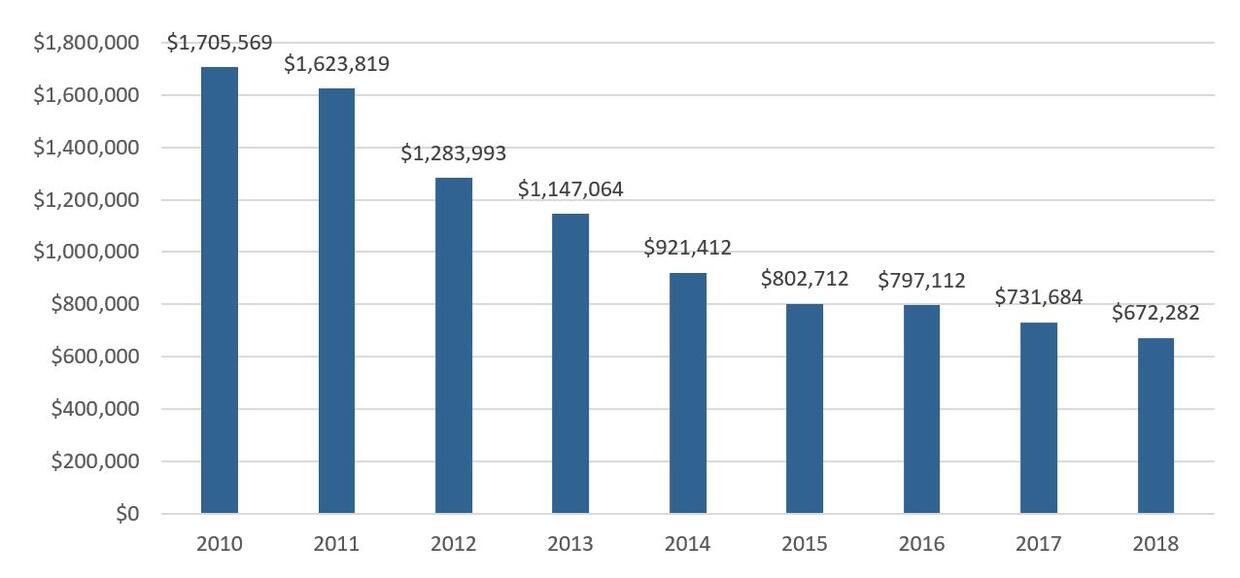Overview
The Norfolk Sheriff’s Office (NSO) was established as a state agency on January 1, 2010, pursuant to Chapter 61 of the Acts of 2009. This act transferred to the Commonwealth, except where specified, all functions, duties, and responsibilities of NSO and the other six county Sheriffs’ Offices that still existed, including assets, liabilities, debt, and potential litigation. This legislation made the Sheriffs employees of the Commonwealth; however, they are still elected officials with administrative and operational control of their offices.
NSO’s jurisdiction is Norfolk County, which includes 28 cities and towns.1 According to July 1, 2018 estimates from the United States Census Bureau, Norfolk County has a combined population of approximately 700,000.
NSO received state appropriations of $30,331,946, $30,938,585, and $31,247,971 for fiscal years 2017, 2018, and 2019, respectively. According to NSO management, the office received supplemental funding of $6,051,119, $3,933,937, and $4,224,981 for fiscal years 2017, 2018, and 2019, respectively.
NSO’s Civil Process Division (CPD) is located at 181 Parkingway in Quincy. According to the NSO website,
The Norfolk County Sheriff’s Office Civil Process Division is a professional law enforcement agency whose responsibility is the delivery of legal services and the enforcement of civil orders in Norfolk County. Our Civil Process Office is responsible for executing court orders and the delivery of legal documents essential to the proceedings of state-wide and county civil cases. . . .
The Civil Process Office also enforces judgments made by the court which include but are not limited to seizing property and selling property through a Sheriff’s Sale (Writs & Levies), garnishing wages, and facilitating Capias arrests [physically arresting a defendant to bring him/her to court].
As of December 31, 2018, CPD employed nine full-time state employees, who were compensated through NSO’s state appropriation, and four Deputy Sheriffs, who were contract employees compensated from commissions paid through CPD’s General Revenue account.
According to the NSO website,
The High Sheriff of the County is mandated to serve civil process. MGL C. 37, section 3 empowers the sheriff to appoint Deputy Sheriffs to perform official acts of process. In Massachusetts, as in most states, the service of process is carried out by the Sheriff, through deputies. . . . Appointed Deputy Sheriffs are trained to properly deliver important court and non-court documents and are held to the same high standards as any law enforcement official in the Commonwealth.
Although it has no separate appropriation line item, CPD is funded through a combination of NSO’s state appropriation and the revenue received in the division’s General Revenue account, which is maintained outside the Massachusetts Management Accounting and Reporting System. The division generates revenue from fees charged for the delivery of legal documents and from the sale of seized property. CPD revenue totaled $1,302,437 for the audit period.
According to CPD management, revenue at CPD has declined steadily since fiscal year 2011, when changes to Section 34 of Chapter 235 of the Massachusetts General Laws were made based on Chapter 432 of the Acts of 2010. These changes limited CPD’s authority to seize motor vehicles and thus reduced its revenue stream. Previously, a debtor who owned a vehicle valued at $700 or less was exempt from having his/her vehicle seized. Under the new law, a debtor who owns a vehicle valued at $7,500 or less is exempt from having his/her vehicle seized. Additionally, a debtor who is more than 60 years old or handicapped, and who owns a vehicle valued at $15,000 or less, is exempt from having his/her vehicle seized.
Additionally, collection attorneys are responsible under Rule 4.1 of the Federal Rules of Civil Procedure for notifying debtors of court orders. Collection attorneys use the services of CPD deputies to serve such notice. However, the new debt collection regulations promulgated by the Massachusetts Attorney General on March 1, 2012 have limited how often debtors can be notified and have prohibited notification in some cases. Because of these restrictions, the frequency with which CPD deputies serve such notice for collection attorneys has declined, along with associated revenue.
CPD Fiscal Year Revenue
Source: CPD management.
CivilServe Application
CPD uses the CivilServe application to track court case papers and data, record service and payment activity, reconcile financial data, create correspondence, and produce detailed reports of all these activities. CPD clerks enter each case into CivilServe separately, and each case is assigned a sequential jacket number. All documents received from attorneys or other individuals, such as defendants representing themselves, are electronically scanned into their jackets, and the clerks enter fees for the service/s as well. Jackets are then assigned to Deputy Sheriffs for serving process. After serving process, the Deputy Sheriffs record the fact that they have done so on a tablet computer, which automatically updates the jacket, indicating that the service has been performed. The clerks then complete an invoice of fees in CivilServe and a return of service (ROS), which is the proof that the service has been completed. They return the original ROS and the invoice to the attorney or other individual, and the jacket is closed.
Additionally, CivilServe generates reports that include commissions and accounts receivable for Deputy Sheriffs (also known as payroll and deputy accounts receivable reports), receipts entered, and invoices generated for services delivered by Deputy Sheriffs.
| Date published: | February 5, 2020 |
|---|
